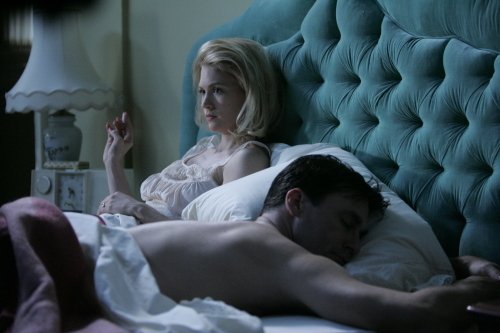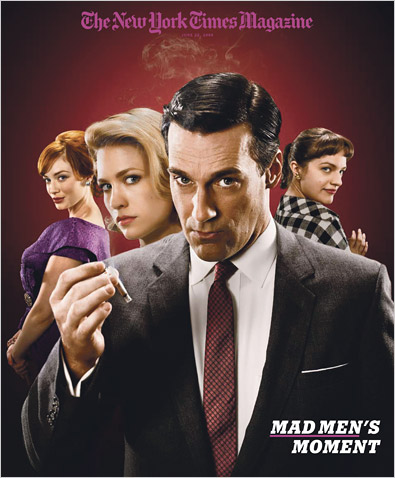by DionysusPsyche
A show that takes you back (or there for the first time if you're too young to to have had experienced it). In an age where business people were business men and openly misogynistic. Women in the work place were secretaries and switch board operators. When most women were housewives and mothers, and those that worked hoped to become housewives and mothers. Gay meant joyful or you were in the closet, and not in an “everybody knows” kind of way. If you weren't Caucasian, you were “foreign.” Nixon vs. Kennedy. The show that's a double sided coin—one side glitzy and glamorous, the other side blue and depressing.
Mad Men is a television drama set in the early 1960's at an advertising agency in New York City called Sterling Cooper. Although the cast isn't small (it took awhile to keep everybody straight and everyone's name), the focus is one of the top executives and his close confidantes at said firm, Don Draper (Jon Hamm).
Who is Don Draper? We learn that no one really knows Don—not Roger Sterling, his co-pilot at the company who begs us to ask ourselves this question as he asks Don over drinks. Not Peggy, his new secretary. Not even his wife (January Jones) and kids. To the public, Don has the world on a string—the perfect wife, family, and job. He's a man of few words, yet those words make magic. “Advertising,” he says, “is based on one thing—happiness. And you know what happiness is? Happiness is the smell of a new car. It's freedom from fear. It's a billboard on the side of the road that screams reassurance that whatever you are doing is okay. You are okay.”
He has a presence that exudes confidence, but with it a mystery. Hiding beneath his suit is a pocket full of secrets. A past life that no one ever hears about—women no one knows about. Yet, he uses his worldy past to push products and considers himself a salesman at heart—even though he doesn't say it. He always appears to be frowning, even when he's enjoying a glass of liquid inspiration at the office (yes, everyone drinks and smokes at work, one of the biggest and most common contrasts to the present day in the show). One of my favorite moments is when Don spends his Saturday trying to put a playhouse together for his daughter and frustratingly goes through more and more glasses of alcohol. By the end of the first season, his 8 year old daughter knows how to make daddy a drink.
Don shares his work life with a bustling office. His upstart account executive, Pete Campbell (Vincent Kartheiser), is a 20-something from old money about to tie the knot and blatantly drools at the mouth for Don's job. Don is less than impressed. Joan Holloway (Christina Hendricks), the “Marilyn Monroe” of the office, plays office manager, head of the secretary pool, and also likes telling Peggy, the newbie, how to live her life—i.e. try not to sleep with everyone in the office, because they'll all try to sleep with her. Roger Sterling (John Slattery) is the silver fox of a co-founder who likes Don to fix things and shares Don's taste for younger women.
However, this AMC award winning show has something else going for it. More than the awe of a moving three page ad, Mad Men is Don Draper. He's not all that different from the Tin Man in the Wizard of Oz. He walks to the Emerald City with his friends and his oil can (or whatever alcoholic equivalent Draper drinks), and he is looking for something more (although I can't say with all honesty that Don is looking for a heart—although it appears that he needs one or at least the reminding of one). He has a stereotypical American Dream, but what he really wants is what he sells: happiness. This is something he lacks, at least half the time.
Except for very limited supporting characters, every character has his/her own dilemma and chooses the less scrupulous option. This cast of characters are individually cracked when it comes to their morals in some regard. They're each looking for something better—grasping at a way to get by, get ahead, get better, get some. The Drapers, and the rest of the crew, have the tools to make themselves happy without ruining each other. Even if they hide it under metal and sharp edges. Whatever they're doing, art imitates the darkest and brightest life in the 1960's. It wasn't all Tiffany's and gold, some of it was tears behind doilies. Mostly, we just see the misery in HD (as opposed to black and white and technicolor).
 |
| Help me, Don Draper, you're my only hope |
Comparing present day to the show itself is hard for me to do, not having lived through the era, and although things are different, rich people are still unhappy and working folks regardless of income are still scrambling to reach the top and to make ends meet so their families survive. It does show that home life has improved for many couples out there as well as different life style choices instead of one-size-fits-all.
One of the characters that I find develops most, at least throughout the first two years, is Peggy Olson (Elisabeth Moss). She starts out as what I deem to be one of the more annoying characters on the show, and yet, she's the only one you feel like you can relate to/sympathize with most. Her play-by-the-rules attitude that aggravates her while everyone else walks around fornicating, drinking, and throwing it all away, pays off when she puts her sweat into the sales by being there when everyone else is hungover, playing hooky, or at each other's throats. She stops hoping and starts demanding things, and gets it. She changes her mind about what she wants when her dreams don't play out as she'd like, and she grows stronger for it. She uses Don and the others, as an example of what not to do.
Real life television footage and history is incorporated into the show such as the election of President Nixon, the Bay of Pigs, and the death of Marilyn Monroe. At one point, the Drapers' neighbors announce they've built a bomb shelter, and Pete Campbell complains to his wife that, quite frankly, “This is ridiculous. If I'm going to die, I want to die in Manhattan” (as opposed to going to her parents' house).
Conclusion
Mad Men is a show I was slow to get into, but that's how I've felt about a lot of older movies and television too (fitting since it's a time capsule show). On account of the high acculades of others, I gave it a chance, and I'm glad I did. If truly night time dramas or time piece shows are something you show interest in, I highly recommend this. However, if drama itself, frequent sex, and the retelling of Dirty Rotten Scoundrels and their weaknesses doesn't appeal to you, I'd steer clear.



Hot damn, DionysusPsyche! I think that was the best review I've ever read from you. It is going to be hard to follow with my own impressions of the series, but I'll give it a shot and post it first thing next week. It'll be fun to see our different thoughts on it =)
ReplyDeleteNice. I agree completely about Peggy and her slow rise. Laughed my ass off during the episode she had to pitch the "revitalizing" electric underwear. And Don drunkenly building a playhouse was fun too. I think Mad Men is the best portrayal of the functional alcoholic on TV.
ReplyDeleteI completely agree, Joe. I have a lot of moments that I LOVE that give crucial plot points away though, like Peggy's talk with Pete Campbell or Don breaking his son's toy and then confessing to his wife that he loathed his father and fears his kids hating him. Stuff like that. :)
ReplyDelete